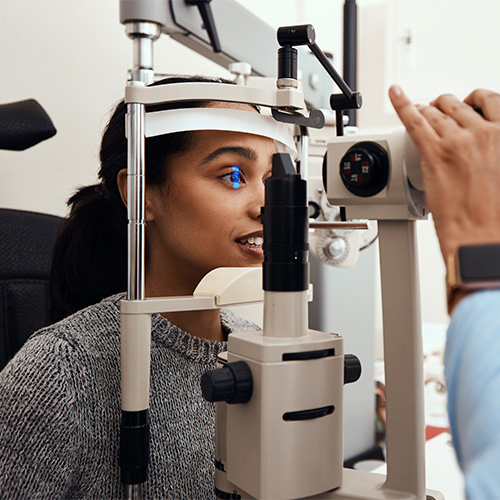Eye Exams For the Whole Family
Routine eye exams are important, regardless of your age or physical health. During a complete eye exam, your eye doctor will not only determine your prescription for eyeglasses or contact lenses, but will also check your eyes for common eye diseases, assess how your eyes work together as a team and evaluate your eyes as an indicator of your overall health.

Need an Eye Exam to Update Your Prescription?
A comprehensive eye exam includes a number of tests and procedures to examine and evaluate the health of your eyes and the quality of your vision. These tests range from simple ones, like having you read an eye chart, to complex tests, such as using a high-powered lens to examine the health of the tissues inside of your eyes.
Eye care experts recommend you have a complete eye exam every year to assess your risk for potentially damaging eye conditions, as well as to keep on top of any changes in vision you may be experiencing.
Eye Care for Everyone
How Often Do You Need to See the Optometrist, Based on Age?
The AOA recommends an annual eye exam for any patient who wears eyeglasses or contacts. If you don't normally need vision correction, you still need an eye exam every year. Doctors often recommend more frequent eye examinations for people with diabetes, high blood pressure and other disorders, because many diseases can have an impact on vision and eye health.
Since the risk of eye disease continues to increase with advancing age, everyone over the age of 60 should be examined annually.
If you are over 40, it's a good idea to have your eyes examined every one to two years to check for common age-related eye problems such as presbyopia, cataracts and macular degeneration.
Eye Exams for Children
Some experts estimate that approximately 5% to 10% of pre-schoolers and 25% of school-aged children have vision problems. According to the American Optometric Association (AOA), all children should have their eyes examined at 6 months of age, at age 3 and again at the start of school. Children without vision problems or risk factors for eye or vision problems should then continue to have their eyes examined at every year throughout school.
Children with existing vision problems or risk factors should have their eyes examined more frequently. Common risk factors for vision problems include:
- premature birth
- developmental delays
- turned or crossed eyes
- family history of eye disease
- history of eye injury
- other physical illness or disease
The AOA recommends that children who wear eyeglasses or contact lenses should have their eyes examined at least every 12 months or according to their optometrist's instructions. Read more about Pediatric Eye Exams.
Schedule an Eye Doctor's Appointment
Contact our eye care clinic to schedule an eye exam near you, today.
What Our Patients Are Saying
Me and my mom went in to see Dr. Jenks back in November. I had scored around 42 and with my new pair of glasses my score is now at a 14! I didn’t know BVD is what was causing so much of my daily struggles and he helped me understand why and how to fix it! I 100% recommended going here if you're having any signs of BVD.
- Jenna R.
Dr. Jenks is a patient and caring doctor. My situation is complicated and he took his time with my appointment and made sure I received the care and attention I needed. Karen and the office staff are also very helpful and kind.
- Jessica P.
I had a great experience with Dr. Jenks and his office! I have been struggling with symptoms of BVD for years without really knowing what it was. I finally decided to see a specialist and I’m so glad I did! He helped me understand my symptoms and their causes more thoroughly, even some things I didn’t realize were related to BVD. He was very thorough in his exam to ensure we had a full picture of what was going on. With an official BVD diagnosis, he helped me develop a treatment plan and select new glasses for my prism lenses. I instantly felt so much better in the trial pair! I would highly recommend Dr. Jenks, especially if you think you may have BVD. Everyone in the office was so kind and welcoming, we had a great experience!
- Emily A.





